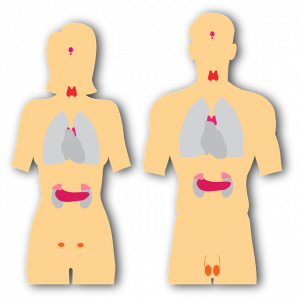Thyroid disease. What is the role of the micronutrient trace element selenium in thyroid disease? The thyroid gland is the organ in the body that contains the greatest amount of selenium per gram of tissue [Wang 2023]. Even in times of low dietary selenium intakes, the thyroid gland has high priority for the supply of selenium in the body [Schomburg 2020].

Dietary selenium intakes vary considerably from region to region in the world. There are large differences in the soil content of selenium and in the factors that influence the bioavailability of selenium to plants. As a consequence, individuals’ plasma/serum selenium status varies accordingly [Winther 2020]. Thus, widespread sub-optimal selenium status has been reported throughout Europe, the United Kingdom, and the Middle East [Stoffaneller & Morse 2015].
Human studies show a strong association between selenium intake and selenium status, on the one hand, and thyroid disease on the other hand. However, the evidence for the clinical significance of selenium in thyroid disease remains unclear; more clinical studies are needed [Wang 2023].
Prioritized Supply of Selenium to the Thyroid Gland
There is prioritized supply of selenium to the thyroid gland, even in times of low selenium intakes. With this in mind, Schomburg [2020] points out that small differences in dietary selenium intake are not likely to affect selenoprotein expression in thyroid gland cells and tissues significantly. Schomburg hypothesizes that the benefit of selenium supplementation is not directly to the thyroid gland.
Instead, the benefit is to the immune system, which does not receive priority supply of selenium. In times of selenium deficiency, the immune system is not able to express the selenoproteins needed for adequate immune response to challenges, e.g., by infection, shock, trauma, iodine deficiency, pregnancy, and other strong threats. In selenium deficiency, Schomburg says, the thyrocyte-lymphocyte interaction becomes disturbed and suboptimal [Schomburg 2020].
Selenium and Graves’ Hyperthyroidism – the GRASS Study
On March 30, 2024, we reported on the clinical research related to selenium supplementation and hypothyroidism. Here, we review the status of research into selenium supplementation and Graves’ hyperthyroidism.
In 2013, Watt et al announced the study protocol for the GRASS randomized controlled trial of the efficacy of selenium supplementation for patients with Graves’ hyperthyroidism.
At that time, the researchers’ aim was to enroll 492 Graves’ disease patients. The researchers would randomly assign the study participants to an active treatment group (two tablets of 100 mcg selenium once daily) or to a placebo group (two identical placebo tablets once daily) for 24 to 30 months [Watt 2013].
As the primary study outcome, the researchers looked for a decrease in anti-thyroid drug treatment failure after 24-30 months of selenium supplementation. They wanted to know if the selenium supplementation, as compared to placebo treatment, could keep the Graves’ disease patients’ thyroid values normal one year after the cessation of anti-thyroid drug therapy treatment without any need for further anti-thyroid drug treatment. They wanted to see if the selenium supplementation would lead to faster and longer lasting remission and to improved quality of life in patients with Graves’ hyperthyroidism. The trial results would, thus, be relevant to daily clinical practice [Watt 2013].
At the present time, we expect publication of the outcomes of the GRASS clinical study sometime in 2025. Note that the very long study period is necessary. Typically, the Graves’ disease patients are treated for 12 to 18 months with anti-thyroid drugs. Then, the patients must be in remission for one year after stopping anti-thyroid drugs [Watt 2013].
Selenium and Hyperthyroidism – Meta-analysis of Studies
Song et al analyzed the pooled data from seven studies enrolling 209 patients with Graves’ disease. In the analysis, selenium supplementation significantly increased serum selenium and selenoprotein concentrations. [Song 2023].
The researchers found that selenium supplementation combined with antithyroid drugs was significantly more effective than placebo combined with antithyroid drugs [Song 2023]:
- reduced free triiodothyronine (FT3) and free thyroxine (FT4) levels
- reduced thyrotropin receptor antibody (TRAb) and thyroid peroxidase antibody (TPOAb) levels
Conclusion: Selenium and Graves’ Hyperthyroidism
Selenium is a trace element that is vital for human health. In times of sub-optimal dietary selenium intakes, supplementation most likely benefits immune system function more than thyroid gland function [Schomburg 2020].
The explanation for why low selenium status is associated with thyroid disorders and why selenium supplementation strengths thyroid function may be, in part, that selenoproteins play an antioxidant and immunomodulating role [Song 2023; Schomburg 2020].
In patients with Graves’ disease (hyperthyroidism), selenium supplementation together with antithyroid medications may improve thyroid function considerably [Song 2023].
Some clinical evidence indicates that certain patients Graves’ disease or Graves’ orbitopathy will respond positively to selenium supplementation [Schomburg 2020].
Sources
Schomburg L. The other view: the trace element selenium as a micronutrient in thyroid disease, diabetes, and beyond. Hormones (Athens). 2020 Mar;19(1):15-24.
Song Q, Ji X, Xie Y. Effects of antioxidant supplementation on Graves’ Disease: A meta-analysis. Journal of Clinical Pharmacy and Therapeutics. 2023; Article ID 5587361.
Stoffaneller R, Morse NL. A review of dietary selenium intake and selenium status in Europe and the Middle East. Nutrients. 2015 Feb 27;7(3):1494-537.
Wang F, Li C, Li S, Cui L, Zhao J, Liao L. Selenium and thyroid diseases. Front Endocrinol (Lausanne). 2023 Mar 24;14:1133000.
Winther KH, Rayman MP, Bonnema SJ, Hegedüs L. Selenium in thyroid disorders – essential knowledge for clinicians. Nat Rev Endocrinol. 2020 Mar;16(3):165-176.
The information presented in this review article is not intended as medical advice. It should not be used as such.
